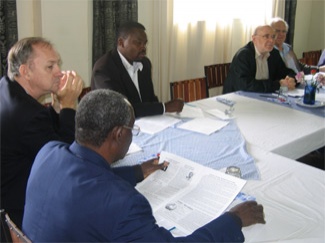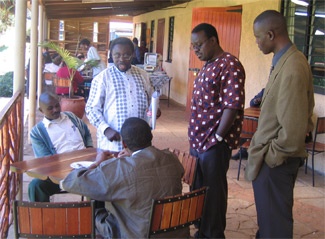|
|
The first meeting of the World Evangelical Alliance (WEA) Theological Commission (TC) held in Africa took place 21-23 September 2006 in Kenya and attracted an aggregate of about sixty people to its various study, fellowship and planning sessions. TC members from nine countries attended and apologies were received from others who were unable to attend. Many other local theologians also participated.
Almost a dozen papers were given during the study sessions. In the annual TC planning and strategy meeting, steps were taken to plan for new leadership of the organisation over the next few years as several of its key members rotate off. A special feature of the event was the participation of several people who are part of the new extended membership scheme introduced earlier in the year. A considerable number of theologians and students from local seminaries were present to contribute papers; many others shared in discussions.
A mini-consultation on “Religious Fundamentalism as a Global Issue” attracted about twenty participants and heard keynote addresses from Professor Yusufu Turaki of Nigeria/Kenya and Dr. Rolf Hille of Germany; both men are also published in the TC journal, Evangelical Review of Theology. There were also three other papers on relations between Fundamentalism and other forms of faith. A 250-word pastoral statement summing up the conclusions was prepared for international circulation.
Another major feature was a symposium on African theology, in which there were thirty participants from local seminaries. It was introduced by an insightful analysis of the current situation by Dr. James Nkansah, head of theology at the Nairobi Evangelical Graduate School of Theology (NEGST), the host institution. Other papers addressed Christology in Africa, interpretation of the Bible, trends and issues in West Africa and comparisons between Islamic and Christian approaches to scripture.
During the business session plans were laid to fill vacancies in the TC and to seek a younger generation of leaders. Dr. David Parker was appointed for a further term as director of publications and administration, allowing time to find a replacement for him. It was reported that the TC ended the year with an encouraging financial report, but its progress has been continually restricted by inadequate funding, resulting in the ability to take up many opportunities for growth. It is hoped that there can be much stronger financial backing for the TC in the future. A spokesperson for the TC said that expressions of interest are welcome for ways in which greater support can be obtained and for additional personnel, including those suitable for senior leadership. ![]()
|
|
The TC also took further steps in developing its dialogue program and explored further study units. One of the new projects involves cooperation between the TC and member Dr. Tom Oden’s newly-developing Early African Christian Texts project, which is now in partnership status with the TC. It is also anticipated that there will be a study unit on hermeneutics and contextualization to assist in the process of relating Christian teaching and exegesis to local situations.
Reports presented to the TC planning and strategy meeting covered the recent meeting of evangelical theological educators in Thailand, and the initial session of the on-going WEA/Adventist dialogue also held in August 2006. The TC was also updated on developments in the Lausanne Theology Working Group and agreed to participate in its consultation to be held in Kenya, February 2007.
There were also extensive discussions with the Association of Evangelicals of Africa and Kenya Evangelical Alliance leaders on ways in which there could be cooperation with the TC and especially filling the vacancies for African representatives on the TC.
A workshop on HIV and AIDS was also held in conjunction with the annual session. About sixteen people, led by Dr. Ken Gnanakan of India and Prof. Danny McCain of Nigeria, with assistance from World Vision in Kenya, recognized existing programs and resources. A lengthy statement was prepared which includes details of an action plan for a continuing three-year project which is to be an official TC study unit. This plan will develop a network of Christian resources and link into other existing networks, educate congregations and provide them with means with which to develop their ministries in this area of work and develop curriculum for Bible colleges and seminaries.
Hille, executive chair of the TC, said, “The new format of the TC gathering with consultation, networking and business together with fellowship and ministry in the local churches proved to be highly effective. So we will continue this pattern next year when the venue is expected to be the USA. Plans will be developed over the next two years for a similar event in Latin America.”
The visit concluded with several TC members sharing fellowship and preaching in local churches.
(This article was edited from a World Evangelical Alliance Theological Commission news release.)


